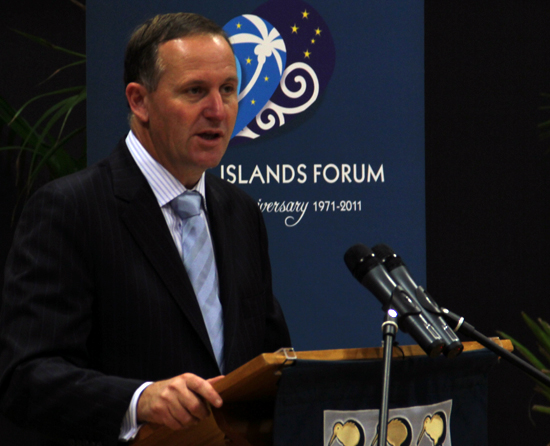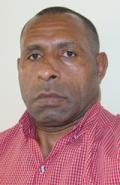
Leadership in development, donor coordination and sustainable economic activities in the Pacific are poised to top the agenda at the Pacific Islands Forum (PIF) meeting in Auckland next month.
This was highlighted by New Zealand Prime Minister John Key during his pre-forum 40th anniversary PIF leaders lecture series speech hosted by Auckland University this week.
Key said New Zealand would be hosting the 42nd PIF meeting against the backdrop of one of the biggest events in this part of the globe – the Rugby World Cup.
PIF 40 years logoAccording to Key, the potential of the Pacific was too often overlooked in the rush to identify problems.
“We need to focus a little more on what our part of the world has to offer rather than what it does not,” he said.
Key pointed out that energy would be the key feature of the upcoming forum which was appropriately themed as “converting potential into prosperity”.
He hoped concrete steps would be taken by the region and its donor partners to realise potential in renewable energy, which was a way of transforming economies and addressing climate change.
Basic necessities
Key said that while the Pacific abounded with vast amounts natural resources there was a need to meaningfully develop these resources in a sustainable manner to provide the basic necessities to the people of the region.
The theme “converting potential into prosperity” is linked to the first two pillars of the Pacific Plan, which are economic growth and sustainable development. The other two of the four pillars that make up the plan are good governance and security.
The Pacific Plan was hatched in 2005 as an outcome of a Pacific-wide survey in 2004 by an “eminent persons group” talking to governments and citizens of forum countries seeking ways to confront issues that challenged human potential.
Secretary-General Tuiloma Neroni Slade said that apart from discussing issues of sustainable economic development in the region, the PIF saw that development in the region could not happen without attention to health, education and interest in the young people.
“The PIF and its rich and long standing prospects are about people for which during the past forty years the Pacific leaders both past and present in their wisdom and foresight came together to pave a way forward for the security and economic prosperity of the Pacific people,” Slade said.
The talks that are supposed to significantly advance the spirit of regional cooperation and mutual confidence are likely to be centred on ensuring dialogue members coordinate support for Pacific countries to get better results where it is most needed.
Health issues
It is understood that health and education issues which are at the centre of the wellbeing of the people in the Pacific will also be the forum’s important points of discussion.
The PIF is a key vehicle composed of 15 independent and self-governing Pacific states including Australia and New Zealand for advancing Regional Corporation in politics and economics and helps presents the regions concerns to the wider world.
A 16th nation – military-ruled Fiji – is currently suspended. Other member countries are; Australia, Cook Islands, Federated States of Micronesia, Kiribati, Nauru, New Zealand, Niue, Palau, Papua New Guinea, Republic of Marshall Islands, Samoa, Solomon Islands, Tonga, Tuvalu and Vanuatu.
Key said New Zealand was proud to host the other member countries as the forum played a major role in developing a sense of Pacific regionalism.
He added that the challenge was to build on the idea of common purpose – the idea that brought Pacific leaders together back in 1971, and harness it to build a brighter future for the whole region.
Apart from political discussions of the forum meeting, the concept of Pacificness would be reinforced through the three-day Pacific Islands showcase at the Cloud exhibition space on Auckland’s waterfront.
John Key’s full Pacific address



